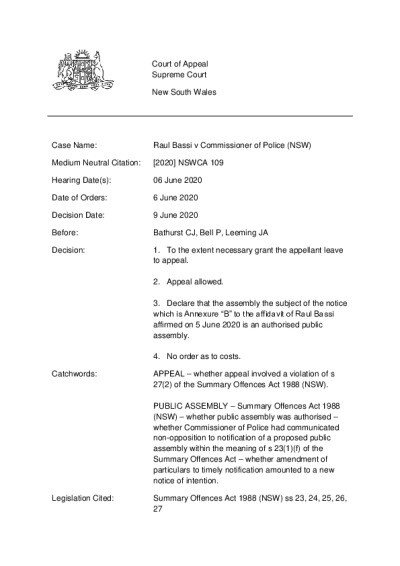
Date
Geographical Area
Pacific
Countries
Australia
Case Name
Bassi v Commissioner of Police (NSW)
Case Reference
[2020] NSWCA 109
Name of Court
Court of Appeal of New South Wales
Key Facts
In response to the rising number of Covid-19 cases within Australia and internationally, New South Wales issued Public Health (COVID-19 Restrictions on Gathering and Movement) Order (No 3) 2020. Under this Order, public gatherings of more than 10 people were prohibited. However, a person wanting to hold a public assembly could submit a notice of intention to hold a public assembly, to which the Commissioner of Police could authorise or oppose.
Bassi submitted a notice of intent as he was organising a vigil of about 50 people in a local park on 6th June in furtherance of the Black Lives Matter cause and in particular in memory of David Dungay. The notice was approved, however, a week before the proposed public assembly he became aware that up to 5,000 people would be attending so amended the notice to reflect this. To Bassi it appeared that the Commissioner agreed with this change, an email sent to him by the Police on 4th June appearing to support this view. However, on 5th June, the Commissioner commenced proceedings in Court to prohibit the proposed public assembly.
In the urgent hearing on 5th June, the primary judge held that the Commissioner had not agreed to the assembly in its amended form and that the amendment amounted to a new notice of intent, which, as it was made within 7 days of the proposed assembly date, required Court authorisation – which they did not give due to the Covid-19 transmission risk. Bassi appealed this decision.
Bassi submitted a notice of intent as he was organising a vigil of about 50 people in a local park on 6th June in furtherance of the Black Lives Matter cause and in particular in memory of David Dungay. The notice was approved, however, a week before the proposed public assembly he became aware that up to 5,000 people would be attending so amended the notice to reflect this. To Bassi it appeared that the Commissioner agreed with this change, an email sent to him by the Police on 4th June appearing to support this view. However, on 5th June, the Commissioner commenced proceedings in Court to prohibit the proposed public assembly.
In the urgent hearing on 5th June, the primary judge held that the Commissioner had not agreed to the assembly in its amended form and that the amendment amounted to a new notice of intent, which, as it was made within 7 days of the proposed assembly date, required Court authorisation – which they did not give due to the Covid-19 transmission risk. Bassi appealed this decision.
Decision and Reasoning
The Court found that the issue did not surround whether the risk of Covid-19 transmission outweighed the rights of free speech and assembly, but rather whether Bassi gave timely notice. They held that he did.
The court stated that although the particulars of the assembly changed very significantly, this did not mean that the original notice of intention ceased to have legal efficacy or that the amended notice was a new notice. Instead, differing from the primary judge, the Court held that the change in the notice’s particulars was amended by agreement between the Commissioner and Bassi – an action permitted under s.24 of the Summary Offences Act. The Court stated that in the email sent to Bassi by the Police detailing the particulars which were altered, the use of the word ‘modified’ suggested that it was the same notice albeit in a modified form, and the request that Bassi bring a signed copy of the amendment form to the Police Station was an “unequivocal indication” of non-opposition. In terms of substance, although there were significant changes to the proposed amount of people attending, the Court noted that s.24 did not limit the nature of amendments which may be agreed on, so could include an amendment of this type.
The court stated that although the particulars of the assembly changed very significantly, this did not mean that the original notice of intention ceased to have legal efficacy or that the amended notice was a new notice. Instead, differing from the primary judge, the Court held that the change in the notice’s particulars was amended by agreement between the Commissioner and Bassi – an action permitted under s.24 of the Summary Offences Act. The Court stated that in the email sent to Bassi by the Police detailing the particulars which were altered, the use of the word ‘modified’ suggested that it was the same notice albeit in a modified form, and the request that Bassi bring a signed copy of the amendment form to the Police Station was an “unequivocal indication” of non-opposition. In terms of substance, although there were significant changes to the proposed amount of people attending, the Court noted that s.24 did not limit the nature of amendments which may be agreed on, so could include an amendment of this type.
Outcome
At 2:45pm on 6 June 2020, the Court declared that the public assembly – beginning at 3pm that day – was an authorised public assembly.
Link
Disclaimer
This case law summary was developed as part of the Disaster Law Database (DISLAW) project, and is not an official record of the case.
Document
Document